|
|
|
Sort Order |
|
|
|
Items / Page
|
|
|
|
|
|
|
| Srl | Item |
| 1 |
ID:
193396


|
|
|
| 2 |
ID:
134064
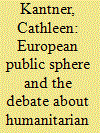

|
|
|
|
|
| Publication |
2014.
|
| Summary/Abstract |
Studies on the democratic control and legitimacy of Common Security and Defence Policy (CSDP) have thus far mostly focused on formal institutions. However, a comprehensive analysis requires including the 'sociocultural infrastructure' in which such formal institutions are embedded. Students of democracy have argued that the public sphere is a crucial dimension, if not a precondition for all mechanisms of democratic control in general. This paper investigates whether and in which ways Europeans participated in transnational European communication on humanitarian military interventions (1990-2005/2006). The paper analyzes a full sample of 108,677 newspaper articles published in leading newspapers of six EU member states, and the US as a comparative case. It demonstrates that the 'national' arenas of political communication are intertwined and allow ordinary citizens to make up their minds about common European issues in the highly controversial and normatively sensitive realm of humanitarian military interventions.
|
|
|
|
|
|
|
|
|
|
|
|
|
|
|
|
| 3 |
ID:
126449
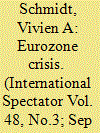

|
|
|
|
|
| Publication |
2013.
|
| Summary/Abstract |
The economic policies of the eurozone crisis, generally presented in apolitical terms, are political both in their underlying principles and in their effects. The EU's 'policy without politics', based on ordo-liberal ideas for macroeconomic austerity and neo-liberal ideas for structural reform, has left the member states with 'politics without policy', in which dissatisfied citizens have had little recourse. This has led to increasing political disaffection, polarisation, and Euroscepticism. Proposals to politicise so as to legitimise the EU by electing the Commission President hold some promise, in contrast to election of the Council President. But the danger, given the eurozone crisis, is that such elections will only politicise so as to delegitimise.
|
|
|
|
|
|
|
|
|
|
|
|
|
|
|
|
| 4 |
ID:
103606
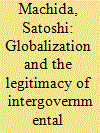

|
|
|
| 5 |
ID:
134062
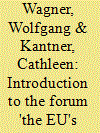

|
|
|
|
|
| Publication |
2014.
|
| Summary/Abstract |
The democratic control and legitimacy of the Common Security and Defence Policy (CSDP) has received growing attention. However, thus far, studies have mostly focused on 'blue prints', i.e., the analysis of formal powers of formal institutions, especially the European Parliament. These studies leave two desiderata that the contributions to this forum aim at overcoming: Firstly, in-depth case studies are required on how formal institutions make actual use of their formal powers in CSDP. Secondly, an examination of the 'sociocultural infrastructure' in which formal institutions and decision-making processes are embedded is required. The contributions to this forum redress both deficits. First, the actual practices of parliamentary involvement in the case of the EU's first maritime mission 'Atalanta' are examined. Second, the most important dimensions of the 'sociocultural infrastructure' are empirically studied, namely public opinion, the public sphere and civil society.
|
|
|
|
|
|
|
|
|
|
|
|
|
|
|
|
| 6 |
ID:
107611
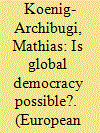

|
|
|
|
|
| Publication |
2011.
|
| Summary/Abstract |
Scepticism about the possibility of a democratically governed global polity is often rooted in beliefs about 'necessary conditions'. Some democracy scholars consider a transition to global democracy to be incompatible with necessary conditions for democratic governance, while some International Relations scholars consider it to be incompatible with necessary conditions for international structural change. This article assesses hypotheses and evidence about democratic transitions within states and transformations in the interaction among states and concludes that arguments based on necessary conditions are not compelling. This suggests that global democracy may be unlikely but it is not impossible.
|
|
|
|
|
|
|
|
|
|
|
|
|
|
|
|
| 7 |
ID:
086302
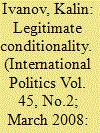

|
|
|
|
|
| Publication |
2008.
|
| Summary/Abstract |
This article analyzes European Union (EU) conditionality regarding the safety of Central and East European nuclear power reactors. Bulgaria, Lithuania, and Slovakia breached or evaded shutdown pledges made in exchange for foreign aid in the early 1990s. Conditionality proved more effective when the European Commission required reactor closure as a condition for accession. However, EU pressure gave rise to legitimacy concerns, as candidate country governments agreed to phase out reactors against the wishes of their citizens. The resultant problems exposed inherent discrepancies between conditionality and democracy. Such discrepancies cannot be resolved by the illusory concept of 'ownership'. Bridging two literatures, the article examines EU conditionality in the context of enlargement's 'democratic deficit'. Previously overlooked factors that discredit conditionality include stereotyping, symbolism, the reluctance to admit mistakes, and popular conspiracy theories about donor motives. Greater attentiveness to such factors can enhance conditionality's legitimacy.
|
|
|
|
|
|
|
|
|
|
|
|
|
|
|
|
| 8 |
ID:
111545


|
|
|
|
|
| Publication |
2012.
|
| Summary/Abstract |
This article considers the likely impact of the global crisis on the prospects for the European project. First, it considers the nature of the current crisis. It argues that it is comparable, in terms of its deep structural character, to the one in the 1930s. The crisis manifested itself first in the financial sector, but was caused by underlying problems of overaccumulation, which explains the succession of speculative booms and busts from the 1980s onward. The article then analyses how the financial crisis transmuted into the current sovereign debt crisis in Europe. It identifies a number of interdependent factors responsible for this: the bailouts of banks following the credit crisis; the stimulus programmes necessitated by the danger of a deep economic recession; the structural problems of the European Monetary Union leading to the accumulation of debt in the peripheral members; and finally the catalytic action of speculation in the financial markets. Finally, the article discusses responses to the debt crisis, outlining the contours of two alternatives (muddling through and Europeanisation), their implications, and some of the conditions for success. The conclusion is rather pessimistic: chances that an effective, timely and sustainable solution will be realised do not seem high.
|
|
|
|
|
|
|
|
|
|
|
|
|
|
|
|
| 9 |
ID:
134067
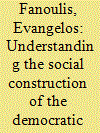

|
|
|
|
|
| Publication |
2014.
|
| Summary/Abstract |
Drawing upon the Foucauldian approach of governmentality, this article argues that the democratic deficit of the EU's Common Security and Defence Policy (CSDP) is the outcome of how governmental power flows in CSDP governance and more precisely within the governance practices of the policy. To support this argument, the narrative explores the secrecy/confidentiality, informality and normalisation of the exercise of governmental power in a concrete example of CSDP governance, the recent pooling and sharing initiative. The example shows that the official makers of CSDP pursue efficiency of governance to the detriment of the democratic quality of the policy, and this is related with the productive and expansive rationality of governmental power flowing in and between the EU institutions. Despite the fact that governmentality usually links to structural explanations, allowing limited space for the role of agency in politics, the article concludes with reflections on how the political agency of the governing EU political subjects contributes to the social construction of the democratic deficit of CSDP.
|
|
|
|
|
|
|
|
|
|
|
|
|
|
|
|
| 10 |
ID:
129580
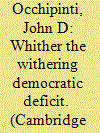

|
|
|
|
|
| Publication |
2014.
|
| Summary/Abstract |
This article examines how the Lisbon Treaty's changes to the European Union's (EU's) Area of Freedom, Security and Justice (AFSJ) have affected its 'democratic deficit'. How this issue is perceived depends on one's conceptual understanding of democratic legitimacy. This article reviews key scholarly perspectives on this matter and organizes these according to Schmidt's concepts of 'inputs', 'throughputs' and 'outputs'. The article then applies this framework to specific innovations of the Lisbon Treaty, including new roles for the European Parliament and Court of Justice in the AFSJ. The article concludes that the EU's latest treaty has improved its democratic deficit in some regards, but that many issues of democratic legitimacy remain.
|
|
|
|
|
|
|
|
|
|
|
|
|
|
|
|
|
|
|
|
|